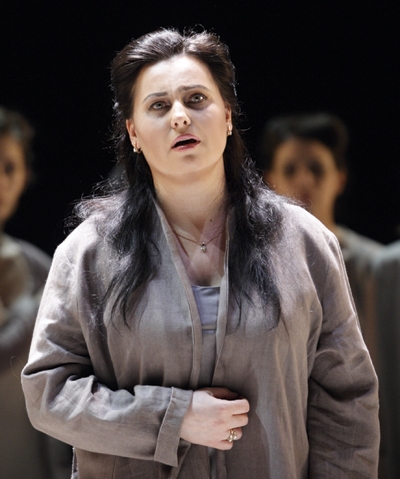Yes, well…aphorisms are never easy to deal with, they are a naturally intimidating form of utterance. If you admit that you don’t understand them, you may well be thought thick. If you reject a request for an explanation of one, on the grounds that what it says can’t be put any other way, you may well get away with it. Many aphorisms are intended to shut down a line of thought, La Rochefoucauld’s for instance, while the best of Nietzsche’s say, in his words, ‘what other people would take a book to say, and would still leave unsaid’. Setting them to music sounds a bright idea for certain composers, but mainly aphorisms advertise their self-sufficiency and ward off any kind of expansion or addition.
Kafka wasn’t one of the masters of the aphoristic mode, and mainly didn’t try to be. So compiling deadly one-liners from his writings requires raiding his letters and diaries, and that is what György Kurtág did for his Kafka Fragments, which was staged at the Linbury Studio last week by Netia Jones, sung (in German) by Claire Booth, who was accompanied by Peter Manning, sometimes on his own violin, sometimes on a mistuned one. The work lasts slightly under an hour, and comprises what the press release describes as ‘40 exquisitely crafted miniatures ranging from a few seconds to several minutes’.
I was mostly bewildered, though it was clear that both performers were exemplary. Manning sat at the side of the stage scraping his fiddle obediently; Booth demonstrated astonishing vocal and acting prowess, striding, leaping, slithering, running, expressively gesticulating, while singing her fragments. It would be going too far to say that she acted out what she was singing, since mostly the fragments, or aphorisms, defy that. ‘Slept, woke, slept, woke, miserable life’ hardly needs enactment, while ‘Coitus as punishment for the happiness of being together’ defies it, and only betrays its author’s need of therapy. ‘Someone tugged at my clothes but I shook him off’ is quite easy to do a relevant movement to, but why bother? That last question became insistent for me — the atmosphere in the Linbury was one of warm response — as the hour progressed, while the piece seemed to be indistinguish-able from the opera Beckett, another ‘iconic’ writer, might have provided the text for.
Rather to my surprise, the new production of Verdi’s third opera Nabucco at the Royal Opera is enormously enjoyable. Or rather, the performance is enjoyable, while the production by Daniele Abbado, with designs by Alison Chitty, is mainly negligible, and occasionally objectionable. The scenery for Act I suggests the Holocaust Memorial in Berlin, the costumes throughout are from the past 70 years or so, and the work is made to be about refugees, which would be all very well if it connected closely with the drama among the main characters, but evidently it doesn’t. This, the most ebullient of Verdi’s early scores, is so vital and energising a work that the sight of innumerable displaced persons — who manage to sing the large number of choruses with immense force — seems to be an elementary error of taste, though a grave one.
Anyone who didn’t know the plot would be confused, too, by the lack of differentiation between the Hebrews and the Assyrians. The self-glorifying Nabucco is dressed just as drably as everyone else. The idol that he and his subjects worship is the flimsiest contraption of wires that ever stood, albeit briefly, and toppling it hardly requires intervention from on high. Such foolishness only serves to underline the utter unrealism of the action — having a prayer to a god instantly answered already shows how far the proceedings are from any world we know. None of that matters, though, when the musical standards are as high as they were on the second night. Nicola Luisotti got things off to a vigorous but trim and precise start, and the accompaniment throughout was so alert that it focused the audience’s attention as well as the players’.
All the solo singing was at least good, and in the case of the Abigaille of Liudmyla Monastyrska sensational. Abigaille is the beginning of the line that leads to Eboli and Amneris, a fire-eater with terrible yearnings for the tenor. The huge range was all secure in Monastyrska’s throat, and one feared that she might sing everyone else off the stage, but she didn’t. Leo Nucci is not, never has been, a strong interpreter, but he made Nabucco’s collapse after the thunderbolt convincing, and the long scene in which Abigaille torments him in his deranged and dishevelled state gave a moving glimpse of what Il re Lear might have been like if ever Verdi had achieved his long-held ambition to write it. The rather recessive lovers Fenena and Ismaele did all they could with their roles, and Vitalij Kowaljow made Zaccaria almost interesting. It was great, too, to hear Robert Lloyd as the High Priest of Baal in such fine form. This was the most satisfying Verdi evening at the Royal Opera for quite a time.





Comments